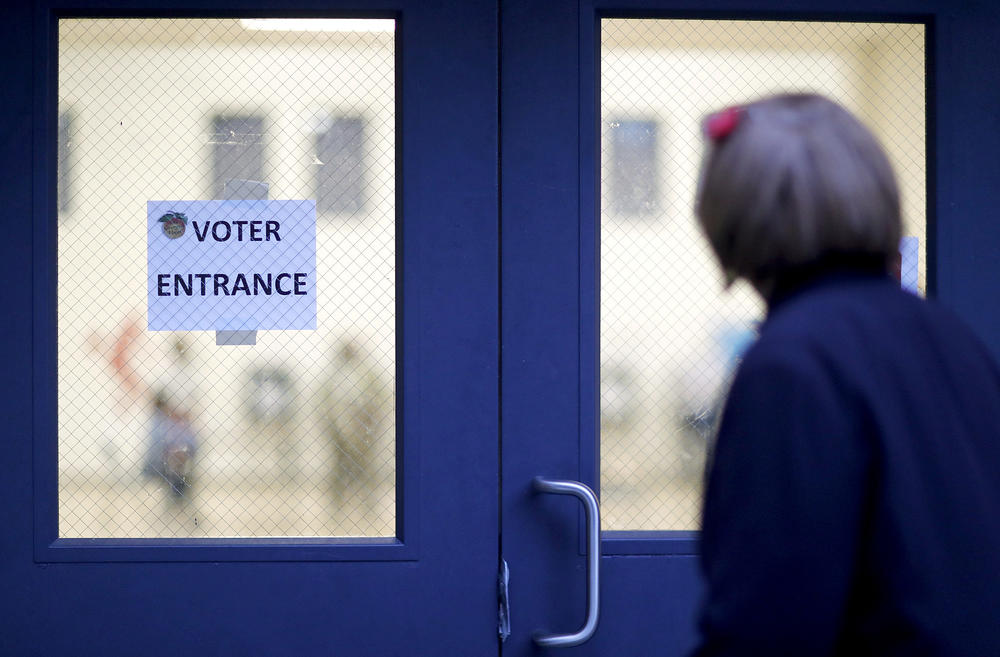Section Branding
Header Content
2018 Midterms: Georgia's Constitutional Amendments Explained
Primary Content
Turnout for this year's election is higher than previous midterms, thanks in part to a nationally-watched governor's race between Democrat Stacey Abrams, Republican Brian Kemp and Libertarian Ted Metz. But beyond the governor's race, other statewide offices and local initiatives, there are seven constitutional amendments and statewide referendums on the ballot as well.
Amendment 1 House Resolution No. 238 Resolution Act No. 414 Ga. L. 2018, p. 1138:
“Without increasing the current state sales tax rate, shall the Constitution of Georgia be amended so as to create the Georgia Outdoor Stewardship Trust Fund to conserve lands that protect drinking water sources and the water quality of rivers, lakes, and streams; to protect and conserve forests, fish, wildlife habitats, and state and local parks; and to provide opportunities for our children and families to play and enjoy the outdoors, by dedicating, subject to full public disclosure, up to 80 percent of the existing sales tax collected by sporting goods stores to such purposes without increasing the current state sales tax rate?”
EXPLAINED:
Advocates for environmental conservation lobbied for 10 years in hopes that legislators and lawmakers would set aside 80 percent of sales taxes collected in sporting goods stores to protect green spaces like water sources, wildlife habitats and parks. By putting up to 80 percent of sporting goods stores’ revenue toward environment protection, this amendment could mean safer spaces for families and children to enjoy to the fullest extent while buying and protecting large areas of land near water sources and in rural areas, preserving wildlife and providing grants to local governments in the metro Atlanta area to design and build parks and trails.
Amendment 2 House Resolution No. 993 Resolution Act No. 410 Ga. L. 2018, p. 1130 :
“Shall the Constitution of Georgia be amended so as to create a state-wide business court, authorize superior court business court divisions, and allow for the appointment process for statewide business court judges in order to lower costs, improve the efficiency of all courts, and promote predictability of judicial outcomes in certain complex business disputes for the benefit of all citizens of this state?”
EXPLAINED:
This amendment would create statewide business courts as a measure to protect businesses and save money. The governor would choose judges for these courts for five-year terms, with the approval of the Senate Judiciary Committee and the House.
The amendment cuts out the need for voters that currently elect judges in trial and appeals court. Under the existing law, Georgia’s State and Superior Courts have been establishing “business court divisions court divisions.” Two operate in Fulton and Gwinnett counties under the Metro Atlanta Business Court. Richmond County also created a business case division in 2017.
As of now, Georgia’s Superior Courts already have divisions that deal with domestic relations, drug offenses and veterans’ cases.
Currently, the state’s Superior Courts have established divisions that deal with domestic relations, drug offenses and veterans’ cases. Additionally, presiding judges currently have the power to assign complex business cases to special masters like retired judges or lawyers in areas of expertise.
Amendment 3 House Resolution No. 51 Resolution Act No. 297 Ga. L. 2018, p. 1127:
“Shall the Constitution of Georgia be amended so as to revise provisions related to the subclassification for tax purposes of and the prescribed methodology for establishing the value of forest land conservation use property and related assistance grants, to provide that assistance grants related to forest land conservation use property may be increased by general law for a five-year period and that up to 5 percent of assistance grants may be deducted and retained by the state revenue commissioner to provide for certain state administrative costs, and to provide for the subclassification of qualified timberland property for ad valorem taxation purposes?”
EXPLAINED:
To give background for this amendment, owners of large timberland received tax breaks since the state constitution’s amendment in 2008. This created the Forest Land Protection Act. For nearly 10 years, Georgia has been sending millions of dollars to school boards within the state and county governments to make up a majority — 97 percent — of what they weren’t collecting from those large timberland owners.
[To qualify for the tax break in 2008, one must be an owner of timberland at least 200 acres and agree to place a restrictive contract or agreement on their property for 15 years. (With the 2018 amendment, that contract would decrease from 15 years to 10 years.)]
Throughout the years, the timberland properties were considered forestland, but not on the fair market value. The new amendment would allow local governments to be reimbursed at rates similar to current property values. Some local governments benefited from the 2008 methodology, while others did not. With the proposed amendment and new formula, the winners could become losers and vice versa.
Another condition of the proposal creates a class of qualifying timberland that is made for sales and would get a tax break. The amendment would shift the responsibility for evaluating the timberland properties from local tax assessor’s offices to Georgia’s Department of Revenue.
A University of Georgia study shows that Georgia’s commercial forests are taxed three times higher than in nearby states, with 4.7 million acres taxed at rates nearly six times higher. That means those millions of acres could turned into commercial buildings or even neighborhoods.
Owners of 50-plus acres who take advantage of the proposed amendment’s new “timberland property” classification would not be required to have any restrictive contracts on their property. Their taxes may go down, but not as much as properties in the Forest Land Protection Act.
The proposed amendment doesn’t make any new provisions for Georgia to reimburse school boards and county governments that lose income from landowners taking advantage of the new land classification.
Amendment 4 Senate Resolution No. 146 Resolution Act No. 467 Ga. L. 2018, p. 1139:
“Shall the Constitution of Georgia be amended so as to provide certain rights to victims against whom a crime has allegedly been perpetrated and allow victims to assert such rights?”
EXPLAINED:
Though Georgia law already provides for notification of crimes’ victims on hearings and other proceedings in their cases, advocates of the proposal hope the protections will hold more weight if added to the state constitution.
The amendment would also provide the victim the right to demand a court hearing if they feel they haven’t received proper notices about their case’s developments.
Amendment 5 Senate Resolution No. 95 Resolution Act No. 278 Ga. L. 2017, p. 857:
“Shall the Constitution of Georgia be amended so as to authorize a referendum for a sales and use tax for education by a county school district or an independent school district or districts within the county having a majority of the students enrolled within the county and to provide that the proceeds are distributed on a per-student basis among all the school systems unless an agreement is reached among such school systems for a different distribution?”
EXPLAINED:
The proposed amendment would remove the requirement that a county school district and a city school district within the county’s boundaries must agree before calling a vote to raise sales taxes for education.
For example, this would impact the city of Atlanta’s school system and Fulton County Public Schools. In Cobb County, where a similar situation exists with Marietta City Schools, the city and county school systems must approve resolutions together and call on voters to approve an education sales tax.
The one-percent sales tax could be enforced for a maximum of five years.
State Sen. Lindsey Tippins said the amendment was proposed because there were circumstances through Georgia where independent school districts serving a small portion of a county’s students would “hold the larger districts hostage” on the vote in hopes of obtaining a larger share of the tax proceeds.
Two other statewide referendums are on the ballot. One referendum deals with homestead exemptions in overlapping jurisdictions the other addresses tax exemptions for homes for the mentally disabled.
Referendum A- House Bill No. 820 Act No. 346 Ga. L. 2018, p. 235:
“Do you approve a new homestead exemption in a municipal corporation that is located in more than one county, that levies a sales tax for the purposes of a metropolitan area system of public transportation, and that has within its boundaries an independent school system, from ad valorem taxes for municipal purposes in the amount of the difference between the current year assessed value of a home and the adjusted base year value, provided that the lowest base year value will be adjusted yearly by 2.6 percent?”
EXPLAINED:
This vote would allow the use of a homestead exemption for homes in a position that is located in more than one county, like in the city of Atlanta for example.
If the site that sits in more than one county poses as an obstruction to the right to have a homestead exemption, then homeowners wouldn’t be penalized because the boundaries of the city exist in two counties.
Referendum B-House Bill No. 196 Act No. 25 Ga. L. 2017, p. 55: “Shall the Act be approved which provides an exemption from ad valorem taxes on nonprofit homes for the mentally disabled if they include business corporations in the ownership structure for financing purposes?”
EXPLAINED:
Provides a tax exemption for certain nonprofit-owned homes for the mentally disabled.



